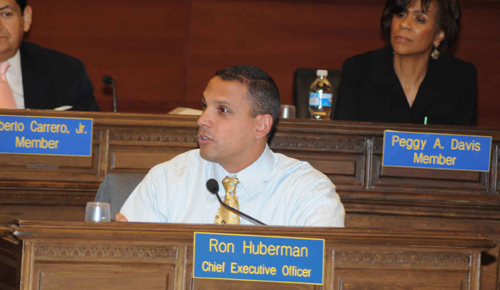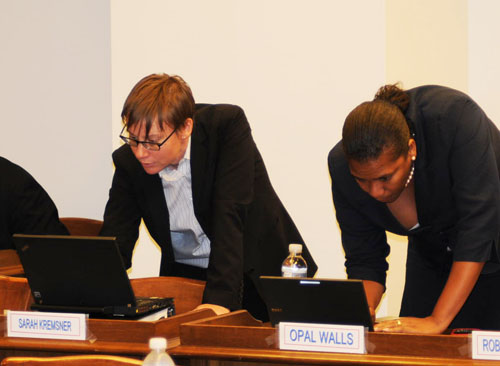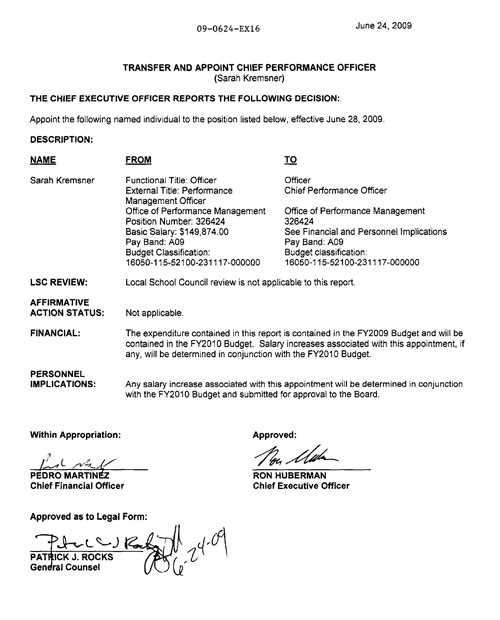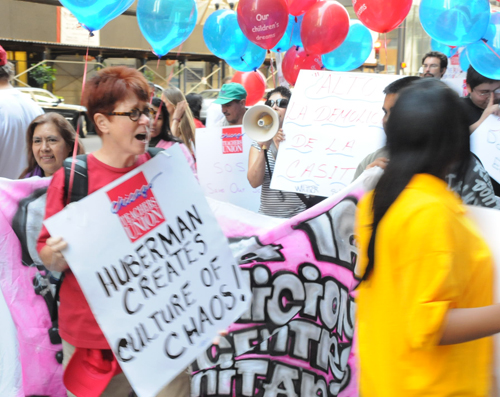Will 'CTA for CPS 2.0' once again 'save' Chicago's public schools? Why is the ability to schedule buses and operate subways in Chicago the key to running the nation's third largest public school system?...
 Chicago Mayor Richard M. Daley appointed Chicago Transit Authority President Ron Huberman as "Chief Executive Officer" of Chicago's public schools in late 2008, following the election of Barack Obama President of the United States in November. Huberman brought in experts and programs based on buses and trains from the CTA, costing millions of dollars before he abruptly resigned in October 2010 when the city learned that Rahm Emanuel would be leaving his White House job to run for Mayor of Chicago. Substance photo by George N. Schmidt.By the time the latest members of the Chicago Board of Education voted to spend more than a million dollars on a bunch of people whose previous experiences in public life had been running a system of buses, trains and subways, it might have been possible for someone in the corporate media to have asked either the members of the Board or Mayor Rahm Emanuel what special skill was developed at the Chicago Transit Authority that led not one but two mayors to decide to go to the CTA when they needed a new "team" to run the city's schools. But as of September 1, 2015, that question has only been asked at Substance, so we begin the first month of our 41st year of publication asking it.
Chicago Mayor Richard M. Daley appointed Chicago Transit Authority President Ron Huberman as "Chief Executive Officer" of Chicago's public schools in late 2008, following the election of Barack Obama President of the United States in November. Huberman brought in experts and programs based on buses and trains from the CTA, costing millions of dollars before he abruptly resigned in October 2010 when the city learned that Rahm Emanuel would be leaving his White House job to run for Mayor of Chicago. Substance photo by George N. Schmidt.By the time the latest members of the Chicago Board of Education voted to spend more than a million dollars on a bunch of people whose previous experiences in public life had been running a system of buses, trains and subways, it might have been possible for someone in the corporate media to have asked either the members of the Board or Mayor Rahm Emanuel what special skill was developed at the Chicago Transit Authority that led not one but two mayors to decide to go to the CTA when they needed a new "team" to run the city's schools. But as of September 1, 2015, that question has only been asked at Substance, so we begin the first month of our 41st year of publication asking it.
In 2009, under Mayor Richard M. Daley, the Chicago Board of Education realized that what the city's public schools needed was a guy who had run the city's transit system. As a result, at the January 2009 Board of Education meeting, Ron Huberman became the "Chief Executive Officer" of Chicago Public Schools. Huberman had been serving as President of the Chicago Transit Authority at the time Daley decided that a transit expert was the person to run the city's public schools.
 By early 2009, with Arne Duncan in Washington D.C. as U.S. Secretary of Education, Chicago's public schools learned that an expert on bus routing formerly with the Chicago Transit Authority, Sarah Kremsner, had become the expert on utilizing "data driven management" to make Chicago's public schools better. Above, Kremsner (left) at a Board of Education meeting in 2009. Substance photo by George N. Schmidt.Huberman eventually brought in a team of CTA people costing several million dollars. Then then he introduced a bunch of programs that, while hailed at first, basically cost tens of millions of dollars more -- only then to be dropped with no evaluation, analysis, or explanation. The first programs came after the Board of Education approved the creation of a department called "Performance Management" and made a transit authority crony of Huberman's the city's first "Chief Performance Officer."
By early 2009, with Arne Duncan in Washington D.C. as U.S. Secretary of Education, Chicago's public schools learned that an expert on bus routing formerly with the Chicago Transit Authority, Sarah Kremsner, had become the expert on utilizing "data driven management" to make Chicago's public schools better. Above, Kremsner (left) at a Board of Education meeting in 2009. Substance photo by George N. Schmidt.Huberman eventually brought in a team of CTA people costing several million dollars. Then then he introduced a bunch of programs that, while hailed at first, basically cost tens of millions of dollars more -- only then to be dropped with no evaluation, analysis, or explanation. The first programs came after the Board of Education approved the creation of a department called "Performance Management" and made a transit authority crony of Huberman's the city's first "Chief Performance Officer."
Some of the programs later put into place by Huberman were financed by the federal government, following an international scandal when the murder of a South Side high school student became a You Tube video while Mayor Daley and his top management people were in Copenhagen lobbying to get the 2016 Olympics for Chicago. The Derrion Albert murder brought then U.S. Attorney General Eric Holder to Chicago for a high profile press conference against "violence" at City Hall, and CPS got $65 million in federal money.
That money was spent on a program Huberman and CPS propagandists called "Culture of Calm."
 Newly installed "Chief Executive Officer" of Chicago's public schools Ron Huberman brought in a number of experts from the Chicago Transit Authority in February 2009, a month after his appointment to the education post by Mayor Richard M. Daley. At its June 2009 meeting, the Chicago Board of Education members voted, unanimously and without debate, to create the position of "Chief Performance Officer" and make Sarah Kremsner the first such "Chief" in Chicago public education history. Kremsner continued pushing a more and more bizarre version of what was called "data driven management" until after Ron Huberman announced he was leaving CPS in October 2010. Substance graphic from the Chicago Board of Education's "Action Agenda" (June 2009) by George N. Schmidt.Huberman's original plans included to utilize a specialist in bus routing named Sarah Kremsner to be his chief for data. Kremsner pressured CPS area chiefs (later renamed "network chiefs") to push a micro-version of "data driven management" on the schools. Ignoring the persistent facts that the socio-economic realities facing the children in the schools were the single most important factor in student test scores, the Board members, along with Huberman's staff, regularly claimed that test scores should be raised by a variety of centralized programs, many of which involved the firing of principals and teachers from schools designated as "failing" based on test scores.
Newly installed "Chief Executive Officer" of Chicago's public schools Ron Huberman brought in a number of experts from the Chicago Transit Authority in February 2009, a month after his appointment to the education post by Mayor Richard M. Daley. At its June 2009 meeting, the Chicago Board of Education members voted, unanimously and without debate, to create the position of "Chief Performance Officer" and make Sarah Kremsner the first such "Chief" in Chicago public education history. Kremsner continued pushing a more and more bizarre version of what was called "data driven management" until after Ron Huberman announced he was leaving CPS in October 2010. Substance graphic from the Chicago Board of Education's "Action Agenda" (June 2009) by George N. Schmidt.Huberman's original plans included to utilize a specialist in bus routing named Sarah Kremsner to be his chief for data. Kremsner pressured CPS area chiefs (later renamed "network chiefs") to push a micro-version of "data driven management" on the schools. Ignoring the persistent facts that the socio-economic realities facing the children in the schools were the single most important factor in student test scores, the Board members, along with Huberman's staff, regularly claimed that test scores should be raised by a variety of centralized programs, many of which involved the firing of principals and teachers from schools designated as "failing" based on test scores.
In addition to Huberman's version of "data driven management" under former transit authority authority Sarah Kremsner, Huberman wound up in charge of a program that was invented on the fly following the dramatic murder of Fenger High School student Derrion Albert. While the death of an African American youngster in Chicago is rarely news, the beating death of Derrion Albert, which took place a mile from the school and after school hours were over, became international news because it was videod by someone at the scene, and the video went up on You Tube. The brutal beating of the student became an international scandal, and the newly installed President acted quickly to do damage control.
Attorney General Eric Holder was dispatched to Chicago by Barack Obama. Holder told a City Hall press conference that the federal government would provide a total of $65 million to Chicago's schools over a two year period to fund a program to stop youth violence. Huberman complied with a thing called "Culture of Calm." Culture of Calm purported to utilize data to identify those students most likely to be victims of violence. It also purported to provide programs -- including jobs, counseling, and other things -- for those targeted young people (most of them males) most deemed "at risk."
 By August 2010, protesters organized by the newly elected leadership of the Chicago Teachers Union were criticizing the lopsided priorities and false claims of the Huberman administration. One of the targets of the protests was the so-called "Culture of Calm" programs, which were called by man "Jobs for Jerks, Cash for Creeps, and Amnesty for Assholes" because they gave many drug gang cadre an opportunity to hustle the system, avoid any accountability for their actions in and after school, and even gain lucrative financial rewards from the hustle, which was federally funded. Substance photo by George N. Schmidt.Despite critics who noted at the time that Huberman's data for "Culture of Calm" was also identifying those students most likely to commit murders (most of them were gang members), the $65 million quickly went into high-profile but ultimately low impact programs, many of which were soon recognized as a hustle by Chicago's sophisticated drug gang leaders, and their younger members. Despite its limitations (and an adjacent fact that "Culture of Calm" jobs money was going to the minority of kids who had cut class and engaged in violence, rather than to the majority who did not), the Board of Education's expanding propaganda department (generally called the "Office of Communications" during these years) poured out materials supposedly demonstrating that the $65 million was being nicely spent.
By August 2010, protesters organized by the newly elected leadership of the Chicago Teachers Union were criticizing the lopsided priorities and false claims of the Huberman administration. One of the targets of the protests was the so-called "Culture of Calm" programs, which were called by man "Jobs for Jerks, Cash for Creeps, and Amnesty for Assholes" because they gave many drug gang cadre an opportunity to hustle the system, avoid any accountability for their actions in and after school, and even gain lucrative financial rewards from the hustle, which was federally funded. Substance photo by George N. Schmidt.Despite critics who noted at the time that Huberman's data for "Culture of Calm" was also identifying those students most likely to commit murders (most of them were gang members), the $65 million quickly went into high-profile but ultimately low impact programs, many of which were soon recognized as a hustle by Chicago's sophisticated drug gang leaders, and their younger members. Despite its limitations (and an adjacent fact that "Culture of Calm" jobs money was going to the minority of kids who had cut class and engaged in violence, rather than to the majority who did not), the Board of Education's expanding propaganda department (generally called the "Office of Communications" during these years) poured out materials supposedly demonstrating that the $65 million was being nicely spent.
Ron Huberman served as CEO of CPS from 2009 through 2010. In October 2010, he abruptly resigned as the city's highest paid educator after he learned that his patron, Richard M. Daley, would not be running for another term as mayor.
Huberman was replaced by Interim CEO Terry Mazany, from the Chicago Community Trust. After Mazany was ousted by incoming Mayor Rahm Emanuel, Emanuel brought in his first of two out-of-town CEOs, Rochester Schools Supt. Jean-Claude Brizard. Brizard took over at the June 2011 meeting of the Board of Education, immediately terminated virtually all of the programs Huberman had been hailed for doing except one:
Brizard continued the Huberman policy of claiming every year that CPS faced a "billion dollar deficit."
The departure of Huberman ushered in a four-year period during which the mayor decided that the best people to run Chicago's public schools were from out of town. After hiring, then firing, Rochester's Jean Claude Brizard (who was dumped in October 2012 following the Chicago Teachers Strike of 2012), Emanuel hired former Cleveland, D.C., and Detroit school administrator Barbara Byrd Bennett to be his second CEO of CPS. Byrd Bennett might have survived to this day, had it not been for the mistake of pushing through a contract with an operation she had worked for, SUPES. In June 2013, the Board of Education approved, unanimously and without debate, a $20.5 million contract to provide training for CPS principals to a north suburban operation called "SUPES Academy." By 2015, the federal government was calling Byrd Bennett and others before a grand jury as a result of the SUPES deal, and in June 2015 Byrd Bennett was forced to resign.
Byrd Bennett's resignation in June 2015 gave Rahm Emanuel the opportunity to follow his predecessor's example and return to the Chicago Transit Authority for the talent needed to run the nation's third largest schools system. Although at the time he was appointed by Emanuel to be CEO of CPS Forrest Claypool was working at City Hall as Emanuel's "Chief of Staff," his deepest roots had been in the city's public transportation system, and to a lesser extent, in the city's parks. In both places, Claypool had been a vicious privatizer, trailing a powerful propaganda machine to try and keep bad publicity at bay while promoting himself as a fixer upper kind of executive.
It didn't take long for the propaganda to begin. By early August 2015, the Chicago Sun-Times was carrying hagiographic "news" stories about Claypool's talents, repeating the claim that Claypool was "cutting bureaucracy" at CPS. That version of reality, crafted by a reporter with close ties to Rahm Emanuel, lasted until the August 26 Board of Education meeting, at which Claypool appointed a million dollars worth of executives from his talent pool at the Transit Authority. Following an August 29 Substance expose of the scandal, both the Chicago Sun Times and WBBM radio picked up and carried the story (both on August 31). Despite attempts to massage the data by the CPS "Office of Communications," by the time the mayor met at his first of three "budget forums" at Malcolm X College on August 31, serious questions were being asked again about why the city's bus and train systems were the best place to find people with the talents and experienced to oversee the city's vast public school system.
Comments:
By: George N. Schmidt
Elected School Board alive in Springfield
A bill for an elected school board for Chicago has been introduced by our state rep (Martwick) up here on the northwest side -- and has 40 co-sponsors. It went to the Rules Committee about a week ago, and will be moving forward sometime after Labor Day. Hope you can help encourage everyone in the General Assembly (Democrats and Republicans) to back it, so that we can override the expected Rauner veto on behalf of Rahm and "CEO Power"...


By: Patricia Craig
Teacher
What Happen with the Elected \rSchool Board policy that the people\rVoted on to have\rI with a lot of other thought it passed\rWhen is it going to take place\rWhy is the Mayor just picking people \rand giving them a Job that they don\'t \rknow how to do people out side of \rEducation \rWhat Happen to Children First: